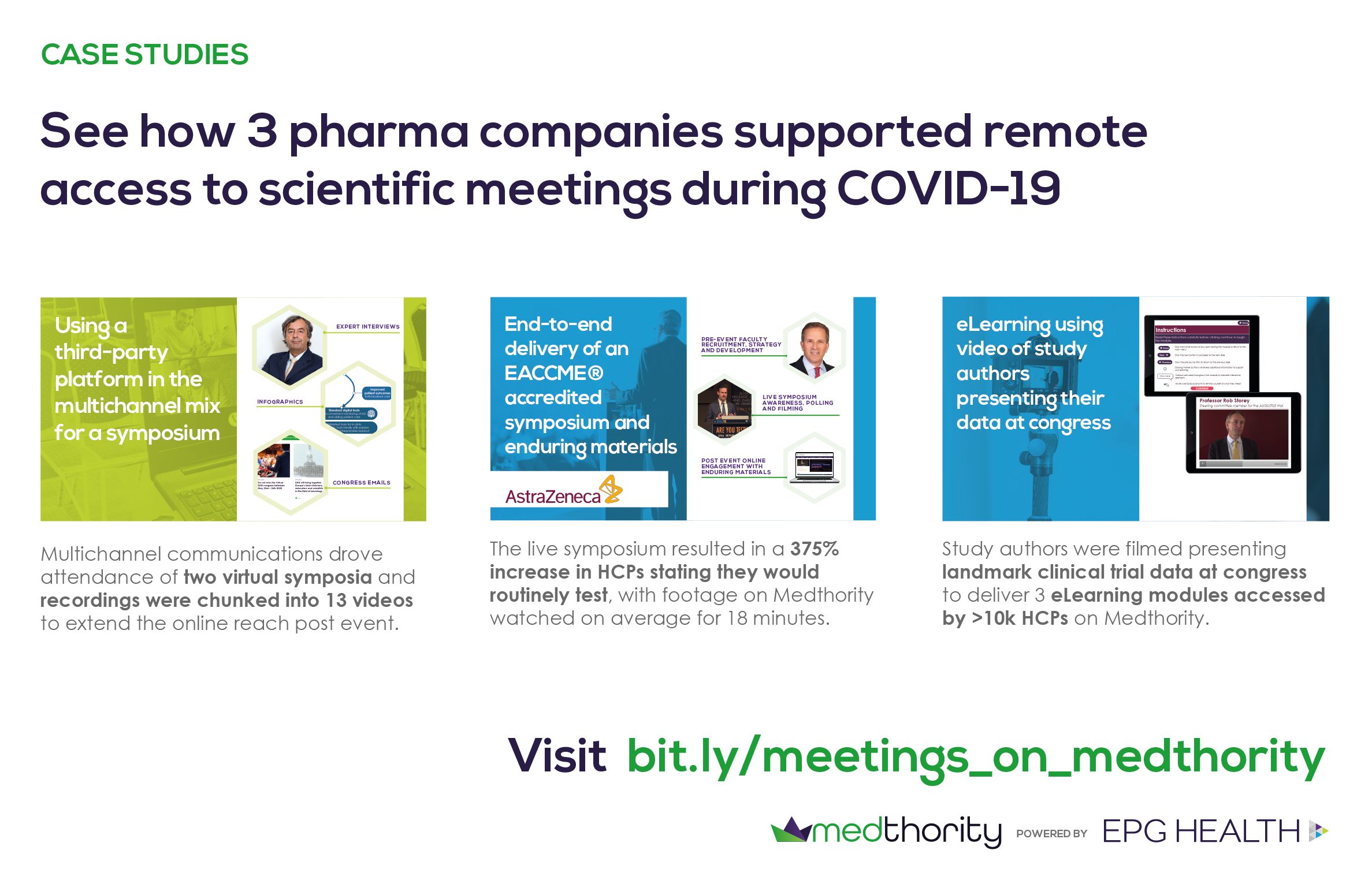Medical meetings post-COVID – key lessons for pharma

EPG Health’s Allen Wellings assesses future symposia and congress models, outlining some learnings about content and reach.
COVID-19 had a huge, and very obvious, initial impact on medical congresses and symposia when 2020’s lockdowns took effect, with many events struggling to move quickly enough to a purely digital format.
While many did succeed in creating digital learning environments during those difficult early months of the pandemic, there are some clear learnings for pharma companies in terms of what and who will succeed in delivering real value in our changing world.
Leveraging the advantages and overcoming the disadvantages
The wholesale move to virtual meetings last year, despite the disruption organisers faced, did come with some advantages. Most notably:
- A far wider audience: attendance was now possible for many physicians who may not necessarily have made it to a meeting in previous years
- Much more measurable: from a pharma perspective, virtual meetings came with greatly increased amount of data for elements like poster downloads, sessions attended, attendee engagement with which to evaluate both impact and learnings.
However, there were also some downsides to having a fully online audience that the industry has had to learn how to mitigate:
- Lower attendance: where effective pre-event awareness wasn’t possible, numbers were lower than they could have been. Furthermore, there was no longer a captive audience, so attendees didn’t have to stay if they were too busy or not finding enough value
- Different time zones: the geographical spread of attendees presented challenges for optimising availability beyond the live event
- Reduced networking opportunities: without face-to-face interaction the chances for personal interaction among delegates and with pharma personnel were compromised.
Read how three pharma companies delivered scientific meetings during the pandemic.
Adapting to virtual and hybrid meetings
As countries emerge from strict lockdowns, events will continue to evolve, with a hybrid format that offers both virtual and in-person options set to be a mainstay of future plans. So maximising the potential of any event now requires greater planning aligned to the advantages and disadvantages of digital versus in-person attendance.
In our experience successful events in this new environment require a precision focus on the experience - before, during and after the event. The key elements to address are:
Timelines: creating awareness through multi-channel outreach needs to start weeks in advance, with a strong agenda, format, message and speaker line-up already established. All of these factors will impact a decision to attend the event. Preparations may take longer but engagement will last longer too.
Content: make it ‘digital first’ and optimise it for live events, whether on-site and online, and for enduring impact. Even pre-COVID, our research found that 81% HCPs wanted access to conference materials post-event, with 90% believing this helped them to apply new information more quickly.
Long symposia recordings, for example, can be quite hard to consume, but the volume of post-event engagement with repurposed content is usually significantly greater than during the event itself. One of the ways that pharma companies can ‘push the needle’ with their events and bolster their value proposition is to surface key educational messages through bite-size chunks. For example, by filming study authors present at a congress and turning that into short video based modules.
Data: Activities like live online symposia can deliver impressive metrics, provided there is clear focus on how and where the key educational messages are surfaced during the event and its enduring materials. Aligning KPIs to the educational messages makes it possible to track their consumption and impact.
Personalisation: Despite the limitations on face-to-face interactions at virtual events, building a sense of personalised experience can still be a point of differentiation. The ability to join interactive breakout sessions, watch on-demand sessions, access relevant content post-event and share opinions before, during and after an event are all smart ways of personalising engagement.
Platform: Let’s not forget the challenges for HCPs in finding and accessing the right events and platforms. It’s really important to deliver scientific meetings and enduring materials through credible and user-friendly platforms, with integrated channels for a convenient omnichannel experience.
The future of medical meetings
Adapting to the advantages and disadvantages of virtual and hybrid events requires new ways of working. In a very different and competitive event space, those that provide the most valuable, digitally-optimised content and experience, will effectively reach and engage more time-poor healthcare professionals (HCPs).
Whether for a hybrid, virtual, or standard congress perspective, companies have to start to push-the-needle on the value proposition they offer.
This must include a focus on pre-event awareness, delivering value before the event and demonstrating why a particular meeting will be relevant to an audience. It must also include value beyond the event, with convenient access to output on-demand. Delivering a great experience for the duration of the event itself will no longer suffice.
The future of scientific meetings is bright - demand is high, many lessons have been learned over the last 12 months and with increasing data to understand and improve HCP engagement, the evolution is set to continue.
- Read three case studies on delivering on-site, virtual and on-demand access to scientific meetings and their output during the pandemic.

More from EPG Health’s HCP engagement series
About the author
 Allen is commercial director at EPG Health, which he joined in 2016. He oversees the pharma-facing teams dedicated to designing bespoke educational programmes for impactful and measurable outcomes aligned to customer and HCP audience objectives.
Allen is commercial director at EPG Health, which he joined in 2016. He oversees the pharma-facing teams dedicated to designing bespoke educational programmes for impactful and measurable outcomes aligned to customer and HCP audience objectives.
About EPG Health

EPG Health is the publisher of Medthority (www.medthority.com), an independent patient management and treatment decision support tool for healthcare professionals.
Easing the discovery and consumption of valuable medical education, EPG Health supports a personalised experience and better outcomes for all stakeholders. A bespoke and integrated toolset helps pharmaceutical companies to reach and engage target audiences with key educational messages while measuring the outcomes.
For more information visit www.epghealth.com












